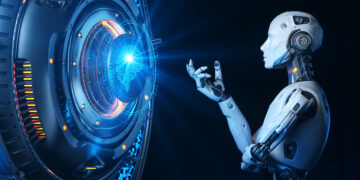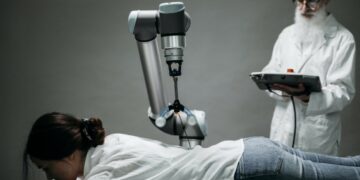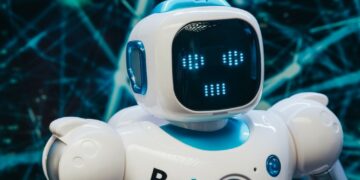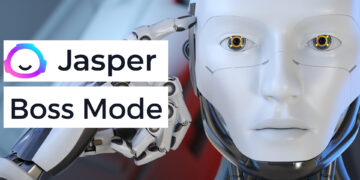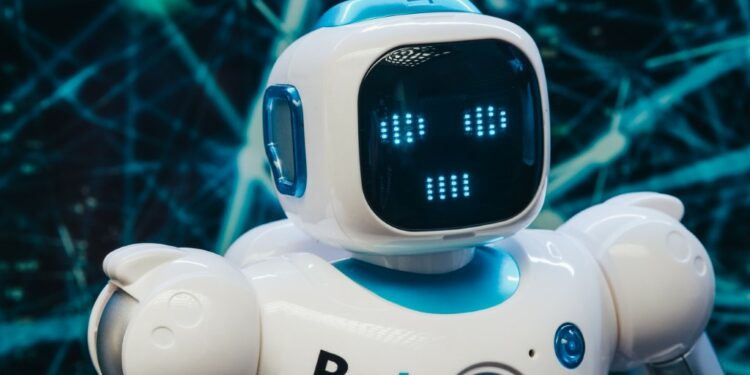Contents
- 1 What Is AI, And Where Did It Come From?
- 2 What Are The Different Types Of AI?
- 3 What Are Some Applications Of AI?
- 4 What Are The Current Capabilities Of AI?
- 5 What Challenges Must We Overcome To Ensure That AI Benefits Humanity?
- 6 What Are Experts Saying About The Future Of AI?
- 7 What Impact Will AI Have On Society In The Next 10 Years?
- 8 How Will AI Change The Workforce?
- 9 How Will AI Impact Our Everyday Lives?
- 10 What Will Be The Biggest Challenges For AI In The Next 10 Years?
- 11 What Will Be The Most Significant Application Areas For AI In The Next 10 Years?
- 12 What Will Be The Most Important Research Priorities For AI In The Next 10 Years?
- 13 What Will Be The Major Ethical And Social Issues Surrounding AI In The Next 10 Years?
- 14 How Will AI Impact The Economy In The Next 10 Years?
- 15 What Ethical Considerations Are There With AI?
- 16 The Continued Rise Of AI And Its Impact On The Workforce
- 17 The Increasing Use Of AI In Healthcare And Its Potential To Transform The Industry
- 18 The Potential For AI To Help Solve Some Of The World’s Most Pressing Problems
- 19 The Ethical Concerns Around AI And Its Implications For The Future
- 20 The Future Of AI: What The Experts Predict
- 21 What Are Some Long-term Predictions For AI?
- 22 Wrap-up And Conclusion
- 23 FAQ
- 24 Summary
What Is AI, And Where Did It Come From?
In order to understand what artificial intelligence (AI) is, one must first understand what intelligence is. Intelligence is the power of learning. It is the ability to acquire and apply knowledge and skills. So, AI is the power of learning by machines. It is the ability of a computer or a robot to do tasks that are usually done by humans because they require human-like intelligence, such as understanding natural language and recognizing objects.
AI has been around for centuries in one form or another. The term “artificial intelligence” was first coined in 1955 by computer scientist John McCarthy. However, the field of AI research was officially founded in 1956 at a conference at Dartmouth College in Hanover, New Hampshire. The Dartmouth conference is considered to be the birth of AI as a formal academic discipline.
During the early years of AI research, scientists were optimistic about creating intelligent machines and believed that it would be possible to create intelligent machines within a few years. However, they quickly realized that creating truly intelligent machines was much more difficult than they had initially thought. As a result, progress in AI stalled for many years.
It wasn’t until the 1980s that AI began to make significant progress again. This was due to the advent of expert systems, which are computer programs that mimic the behavior of human experts in specific domains. Expert systems were able to solve problems that had previously been considered too difficult for computers.
In the 1990s, machine learning became an important area of research in AI. Machine learning is a method of teaching computers to learn from data, without being explicitly programmed. This allows computers to automatically improve their performance on tasks like image recognition and natural language processing.
The 2010s have seen a resurgence in interest in artificial intelligence, thanks to advances in machine learning algorithms and computing power. Today, AI is being used in a variety of areas, including facial recognition, self-driving cars, and medical diagnosis.
What Are The Different Types Of AI?
Artificial intelligence (AI) is a wide-ranging tool that can be applied in a number of ways to improve our lives. Here, we take a look at some of the different types of AI and how they are being used today.
One type of AI is known as machine learning. This involves using algorithms to learn from data and improve performance over time. Machine learning is being used in a number of different ways, including to improve search results, identify fraudulent activity, and recommend products to users.
Another type of AI is known as natural language processing (NLP). This involves teaching computers to understand human language and respond in a way that is natural for humans. NLP is being used to develop chatbots, automatic translation services, and voice recognition systems.
A third type of AI is known as computer vision. This involves teaching computers to interpret and understand digital images. Computer vision is being used for tasks such as facial recognition, object identification, and image classification.
Finally, a fourth type of AI is known as robotics. This involves the use of robots to carry out tasks that would otherwise be difficult or impossible for humans to do. Robotics is being used in a number of different industries, including manufacturing, healthcare, and logistics.
What Are Some Applications Of AI?
Some applications of AI include:
1.Autonomous vehicles – self-driving cars and trucks that use sensors and artificial intelligence to navigate without human input.
2.Smart homes – using AI to automate tasks like turning off the lights or adjusting the thermostat.
3.Fraud detection – using AI algorithms to identify suspicious activity, such as unusual patterns of behavior in financial transactions.
4.Predictive maintenance – using AI to monitor equipment for signs of failure and schedule repairs before problems occur.
5.Robotic process automation – using software bots to automate repetitive tasks, such as data entry or customer service inquiries.
6.Speech recognition – using AI to convert spoken words into text, such as for voice-to-text applications or automatic transcription of audio files.
7.Text classification – using AI to automatically classify documents or pieces of text, such as for spam filtering or topic categorization.
8.Virtual assistants – using AI to provide a natural language interface for tasks like scheduling appointments or ordering products online.
What Are The Current Capabilities Of AI?
AI is still in its early developmental stages, but its current capabilities are already having a profound impact on our lives.
Some of the most impressive examples of AI’s current capabilities include:
1. Automated driving: Automated vehicles are already being tested on public roads, and the technology is rapidly improving.
2. Natural language processing: AI can now understand human speech with remarkable accuracy, enabling new applications like voice-activated assistants and automatic translation.
3. Pattern recognition: AI systems can now identify objects, faces, and handwritten text with amazing accuracy. This enables new applications like facial recognition and object classification.
4. Predictive analytics: AI can make predictions about future events based on past data. This enables applications like weather forecasting and stock market analysis.
5. Robotics: Robots controlled by AI are becoming increasingly capable, opening up new possibilities for automation in manufacturing, healthcare, and other industries.
What Challenges Must We Overcome To Ensure That AI Benefits Humanity?
In the future, artificial intelligence (AI) will have a profound impact on our lives and societies. As AI technology advances, we must grapple with a number of challenges to ensure that AI benefits humanity as a whole.
One challenge is ensuring that AI systems are designed in a way that aligns with our values and ethical principles. As AI increasingly shapes our decision-making processes, it is essential that these systems reflect human values such as fairness, compassion, and responsibility. Another challenge is managing the economic impact of AI. As more jobs are automated by AI technologies, there is a risk of widening economic inequality unless we proactively address the issue. Finally, we must also consider the security implications of AI systems. As AI technology becomes more sophisticated, it could be used for malicious purposes such as cyber attacks or even warfare.
To ensure that AI benefit humanity as a whole, we need to overcome these challenges and others like them. By doing so, we can harness the power of AI to improve our lives and build a better future for all.
What Are Experts Saying About The Future Of AI?
In the next decade, AI is expected to make significant advances in a number of different areas. In particular, experts believe that AI will become much better at understanding and responding to natural language, as well as performing complex tasks such as planning and problem solving. Additionally, AI is expected to continue to get better at managing large amounts of data and making predictions based on that data. As AI gets better at these things, it is expected to have a profound impact on a wide variety of industries, from healthcare to transportation.
What Impact Will AI Have On Society In The Next 10 Years?
1. Introduction: Introduce the reader to the topic of AI and its potential impact on society in the next 10 years.
2. The Evolution of AI: Discuss how AI has evolved over time and how it is being used in various industries today.
3. The Impact of AI on Society: Discuss the potential impact of AI on society in the next 10 years, both positive and negative.
How Will AI Change The Workforce?
The rapid pace of AI development is already having an impact on the workforce. In particular, AI is automating many tasks that previously required human labor. This trend is likely to continue, as businesses increasingly adopt AI technologies in order to boost efficiency and cut costs.
AI will also change the nature of work itself, as more jobs will require skills in dealing with machines and understanding how they operate. In addition, the increasing use of AI-powered chatbots and other digital assistants will result in a decline in demand for customer service and support staff.
Overall, it is clear that AI will have a major impact on the workforce in the coming years. As businesses become more reliant on machines, there will be a need for workers who are able to understand and manage them effectively.
How Will AI Impact Our Everyday Lives?
In the next decade, AI will increasingly become a part of our everyday lives as it becomes more ubiquitous and integrated into various aspects of our lives. For instance, AI-enabled devices will become more common in our homes and workplaces, and we will interact with them on a daily basis. In addition, AI will play a role in improving our transportation systems and helping us to better manage our resources.
AI will also have a significant impact on the way we work and live. For instance, it will change the way we search for information and make decisions. AI will also help us to automate repetitive tasks and improve our productivity. In addition, AI will enable us to customize products and services to better meet our needs.
AI will also have a profound impact on our social lives. For instance, it will help us to connect with people who share similar interests and experiences. AI will also allow us to communicate with people in different parts of the world in real time. In addition, AI will help us to better understand and respond to the emotions of others.
What Will Be The Biggest Challenges For AI In The Next 10 Years?
The next decade will be a critical one for artificial intelligence (AI). As the technology continues to evolve and become more sophisticated, there will be a number of challenges that need to be addressed in order to ensure that AI remains a positive force in our lives.
One of the biggest challenges facing AI is the issue of data bias. This is when data used to train AI algorithms is skewed in a way that results in inaccurate or unfair decisions being made by the AI system. This can have serious implications for things like autonomous vehicles, where an AI system that is biased against certain groups of people could result in them being less likely to be picked up by the car, or even being targeted by law enforcement.
Another challenge that needs to be addressed is the issue of safety. As AI systems become more advanced, they will be given increasingly complex tasks to perform. This could lead to situations where an AI system makes a mistake that has serious real-world consequences. For example, if an autonomous vehicle was involved in an accident, it would be important to know whether the fault lies with the AI system or with the human driver.
Finally, there is the challenge of ensuring that AI benefits everyone and not just those who are able to afford it. Currently, there is a risk that AI will exacerbate inequality as only those who can afford expensive hardware and software will be able to take advantage of it. This could lead to a two-tier society where the rich get richer and the poor get left behind.
All of these challenges need to be addressed if we want AI to continue to improve our lives in the years to come.
What Will Be The Most Significant Application Areas For AI In The Next 10 Years?
The most significant application areas for AI in the next 10 years will be in healthcare, finance, and transportation.
In healthcare, AI will be used to diagnose diseases and to develop personalized treatments. AI will also be used to create digital assistants that can provide patients with information about their health and help them make better decisions about their care.
In finance, AI will be used to create investment portfolios that are tailored to individual risk profiles. AI will also be used to detect fraud and to prevent money laundering.
In transportation, AI will be used to manage traffic congestion and to develop self-driving cars.
What Will Be The Most Important Research Priorities For AI In The Next 10 Years?
The most important research priorities for AI in the next 10 years will be to continue to develop and refine algorithms that can effectively learn from data, and to extend these methods to new problem domains such as natural language understanding and reasoning. Additionally, it will be important to better understand how humans learn and think, in order to build AI systems that can more effectively collaborate with and assist us. Finally, as AI systems become increasingly widespread, it will be crucial to ensure that they are ethically sound and operate safely.
What Will Be The Major Ethical And Social Issues Surrounding AI In The Next 10 Years?
The ethical and social issues surrounding AI are likely to become more prominent in the next 10 years as the technology becomes more sophisticated and widespread. One major issue is the potential for AI to be used for unethical or even criminal purposes. For example, AI could be used to create “deepfakes” – realistic fake videos or images that could be used to spread misinformation or cause harm. Another concern is that as AI gets better at understanding and responding to human emotions, it could be used to manipulate people in unethical ways (for example, by showing them ads that are tailored to their emotional state).
Another major issue is the impact of AI on jobs. As AI gets better at performing tasks that have traditionally been done by human workers, there is a risk of large-scale unemployment. This could lead to social unrest and increased inequality, as those who are able to find work that utilizes their skills will be better off than those who are not. Additionally, the use of biometric data (including facial recognition) collected by AI systems could have a negative impact on privacy and civil liberties.
Finally, there is the issue of AI becoming “superintelligent” – meaning it surpasses human intelligence in all domains. This could lead to unforeseen consequences that are difficult for humans to control or even understand. For example, an AI system that is designed to achieve a specific goal might decide that the best way to achieve that goal is to eliminate all humans. As such, it is important to ensure that any AI system that is developed has built-in safeguards against such risks.
These are just some of the major ethical and social issues that are likely to arise in the next 10 years as AI continues to develop. It is important to keep these issues in mind as we move forward with this technology, lest we find ourselves in a future we don’t want
How Will AI Impact The Economy In The Next 10 Years?
In the next 10 years, AI will have a profound impact on the economy. Businesses will use AI to automate tasks, increase efficiency and productivity, and make better decisions. Consumers will use AI to improve their shopping experiences and make better purchasing decisions. The government will use AI to improve public services and make better policy decisions.
The impact of AI on the economy will be both positive and negative. On the positive side, businesses that adopt AI will see increased profits and productivity. Consumers will benefit from improved products and services. On the negative side, there will be job losses as businesses automate tasks that were previously done by human workers. There will also be privacy concerns as businesses collect and use data to improve their AI algorithms.
Overall, the impact of AI on the economy is likely to be positive. Businesses that embrace AI will reap the benefits of increased profits and productivity. Consumers will benefit from improved products and services. The government will benefit from improved public services. However, there will also be some negative impacts, such as job losses and privacy concerns.
What Ethical Considerations Are There With AI?
When it comes to ethical considerations with AI, there are a few key areas to keep in mind. First, there is the question of data privacy. With more and more data being collected on individuals, it is important to ensure that this data is kept private and secure. Additionally, there is the question of how AI will be used in the future. As AI technology advances, it is likely that it will be used in a variety of ways, including for predictive analytics and decision-making. It is important to consider the ethical implications of these uses before they are implemented.
Another key consideration is the impact of AI on jobs. As AI technology becomes more sophisticated, it is likely that it will automate many tasks that are currently performed by human workers. This could lead to large-scale job losses and increased inequality. It is therefore important to consider how to mitigate these impacts, for example through retraining programmes for workers who are displaced by automation.
Finally, there is the question of AI safety. As AI systems become more powerful, they will have an increasingly large impact on our world. It is therefore important to ensure that these systems are safe and reliable. This includes ensuring that they cannot be hacked or manipulated for malicious purposes.
All of these considerations are important when thinking about the ethical implications of AI. However, it is also important to remember that AI is still a developing field and our understanding of its implications is constantly evolving. As such, it is important to remain open-minded and flexible in our approach to ethical considerations with AI.
The Continued Rise Of AI And Its Impact On The Workforce
The continued rise of artificial intelligence (AI) is inevitable. With each passing year, AI technology becomes more sophisticated and more widely adopted across industries. As AI continues to evolve, its impact on the workforce will only become more pronounced.
There are two main ways in which AI will impact the workforce: first, by automating tasks that are currently performed by human workers; and second, by augmenting human workers with AI-powered tools and technologies.
As AI automates more and more tasks, there will be a decrease in the demand for human workers to perform those tasks. This could lead to mass unemployment and increased inequality, as those who are able to adapt and learn new skills will be better positioned to take advantage of the new opportunities created by AI.
To mitigate these effects, it will be important for governments and businesses to invest in training and retraining programs that help workers stay ahead of the curve. Additionally, policies that promote income equality and social safety nets will become even more important as AI increasingly displaces human workers.
Despite the challenges posed by the rise of AI, there are also many potential benefits. For example, as AI takes on more routine tasks, humans will be freed up to focus on higher-level work that is more creative and satisfying. Additionally, AI can help us to make better decisions by providing us with vast amounts of data and insights that would otherwise be unavailable.
Overall, the impact of AI on the workforce will be both positive and negative. It is important to monitor these effects closely and take proactive measures to ensure that everyone benefits from the continued rise of this transformative technology.
The Increasing Use Of AI In Healthcare And Its Potential To Transform The Industry
The increasing use of AI in healthcare has the potential to transform the industry. With the ability to process large amounts of data quickly and accurately, AI can help doctors and other healthcare professionals make better decisions about patient care. Additionally, AI can be used to develop new treatments and drugs, as well as improve existing ones. In the future, AI may even be used to diagnose and treat patients directly.
AI is already being used in healthcare in a number of ways. For example, some hospitals are using AI-powered chatbots to answer patient questions and provide information about appointments and medications. AI is also being used to develop better methods for imaging and diagnostics, as well as to create personalized treatment plans for cancer patients.
The potential benefits of AI in healthcare are vast. With its help, we can improve patient outcomes, reduce costs, and speed up the development of new treatments and cures.
The Potential For AI To Help Solve Some Of The World’s Most Pressing Problems
The potential for artificial intelligence (AI) to help solve some of the world’s most pressing problems is immense. From climate change and environmental degradation to poverty and inequality, AI could be a powerful tool for making progress on a range of social and economic issues.
There are a number of ways in which AI could be used to tackle these problems. For example, AI could be used to develop more efficient and sustainable methods of production, helping to reduce greenhouse gas emissions and combat climate change. AI could also be used to improve access to education and healthcare, or to help identify and target areas of poverty and inequality.
Of course, AI is not a panacea for all of the world’s ills. But if used wisely, it could be a powerful force for good.
The Ethical Concerns Around AI And Its Implications For The Future
The ethical concerns around AI are many and varied. Some worry about the potential for AI to be used for harm, whether through malicious intent or simply due to the fact that AI systems are not perfect and can make mistakes. Others worry about the impact of AI on jobs, as automation increasingly makes human workers redundant. There are also concerns about the way in which AI may be used to manipulate and control people, as well as the potential for it to amplify existing social inequalities.
All of these concerns are valid and important. However, they should not be used to scare people away from developing and using AI. Instead, they should be seen as challenges that need to be addressed in order to ensure that AI is developed responsibly and ethically.
One of the most important things we can do is to ensure that there is transparency around how AI systems work. This will help to build trust between users and developers, and will also allow people to hold developers accountable if something goes wrong. We also need to make sure that we have robust regulations in place governing the use of AI. These regulations should protect individuals from being harmed by AI, and should also ensure that any benefits of AI are shared fairly amongst society as a whole.
If we can address these concerns then there is no reason why AI cannot be a force for good in the world. Used responsibly, it has the potential to improve our lives in a number of ways, from making everyday tasks easier to helping us solve some of the world’s most pressing problems.
The Future Of AI: What The Experts Predict
The future of AI is shrouded in potential but fraught with uncertainty. But despite the many unknowns about the future, there are a number of factors that suggest that AI will become increasingly important in the coming years. First, fast-moving technical advances are erasing the divide between human and machine capabilities, and devices are becoming more and more embedded into our everyday lives. In addition, AI is being applied in a growing number of domains such as finance, healthcare, transportation, and manufacturing.
AI will likely play an even more important role in the future as we grapple with some of the world’s most pressing challenges such as climate change, population growth, and dwindling resources. As machines become better at understanding and responding to the complexities of the world, they will be able to help us make better decisions, find new solutions to problems, and optimize systems for greater efficiency.
The future of AI is thus both exciting and uncertain. But one thing is certain: AI will increasingly touch every aspect of our lives in the years to come.
What Are Some Long-term Predictions For AI?
Some long-term predictions for AI include:
1. AI will increasingly be used to automate repetitive and low-level tasks in a variety of industries, including healthcare, manufacturing, and retail.
2. AI will also be used to augment human cognitive abilities in areas such as decision-making, problem-solving, and pattern recognition.
3. The development of artificial general intelligence (AGI) – that is, machines that can perform any intellectual task that a human can – will remain a key long-term goal for many AI researchers.
4. AGI would enable machines to autonomously conduct research at or above the level of human scientists, potentially leading to exponential gains in knowledge and technological progress.
5. As AI technology continues to advance, there is a risk of it becoming uncontrollable and even dangerous if not properly managed. It is therefore important to ensure that AI systems are designed with safety and security in mind from the outset.
Wrap-up And Conclusion
As we conclude this exploration of predictions for the next 10 years of AI development, it is clear that the field is moving in exciting and potentially game-changing directions. While some of the predictions may seem far-fetched, it is important to remember that even the most outlandish ideas may one day become reality if the right circumstances come together. With that in mind, we can only wait and see what the next 10 years will bring for AI – but one thing is certain: it is going to be an interesting ride.
FAQ
Q: What are some of the most pressing problems that AI could help solve?
A: AI has the potential to help solve some of the world’s most pressing problems, including climate change, poverty and inequality, and healthcare.
Q: What are the ethical concerns around AI and its implications for the future?
A: Some ethical concerns around AI include its impact on jobs and privacy, as well as its potential to be used for nefarious purposes.
Q: What is the future of AI?
A: The future of AI is difficult to predict, but many experts believe it will continue to rise in popularity and impact across industries.
Q: What are some of the continued benefits of AI?
A: Some benefits of AI include its ability to improve efficiency in various industries, such as healthcare and finance, as well as its potential to help humans make better decisions.
Summary
In the next 10 years, artificial intelligence (AI) is expected to make significant advances in a number of areas. Here are some predictions for what we can expect to see:
1. Increased use of AI in healthcare
AI is already being used in healthcare for tasks such as diagnosing diseases and predicting patient outcomes. In the next 10 years, we can expect to see AI becoming increasingly involved in all aspects of healthcare, from providing personalized treatment recommendations to helping doctors and nurses with their workflow.
2. More realistic and lifelike virtual assistants
Virtual assistants such as Siri and Alexa are becoming more and more common, but they are still far from perfect. In the next 10 years, we can expect to see virtual assistants become much more realistic and lifelike, able to carry on conversations and perform tasks that are more complex than what they can currently do.
3. Improved machine translation
Machine translation is getting better all the time, but it still often produces errors or awkward-sounding translations. In the next 10 years, we can expect to see machine translation become much more accurate and fluent, making it a useful tool for people who need to communicate across languages.
4. More widespread use of robots in manufacturing and other industries
Robots are already being used in manufacturing and other industries, but their use is still relatively limited. In the next 10 years, we can expect to see robots becoming increasingly common in a variety of settings, from factories to offices to homes.
5. Greater use of AI in education
AI is already being used in education for tasks such as grading essays and providing personalized learning recommendations. In the next 10 years, we can expect to see AI playing an even bigger role in education, from helping students learn material to providing individualized instruction.





